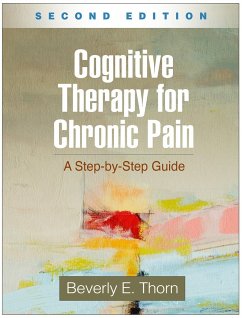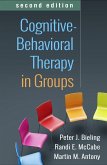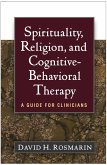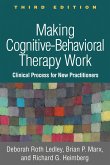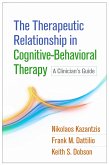Beverly E. Thorn (University of Alabama (Emerita) United States )
Cognitive Therapy for Chronic Pain
A Step-By-Step Guide
Beverly E. Thorn (University of Alabama (Emerita) United States )
Cognitive Therapy for Chronic Pain
A Step-By-Step Guide
- Broschiertes Buch
- Merkliste
- Auf die Merkliste
- Bewerten Bewerten
- Teilen
- Produkt teilen
- Produkterinnerung
- Produkterinnerung
This go-to manual--now revised and significantly expanded with more than 50% new material--has enabled thousands of clinicians to effectively treat clients with chronic pain.
Andere Kunden interessierten sich auch für
![Treatment Plans and Interventions for Insomnia Treatment Plans and Interventions for Insomnia]() Rachel Manber (United States Stanford University)Treatment Plans and Interventions for Insomnia50,99 €
Rachel Manber (United States Stanford University)Treatment Plans and Interventions for Insomnia50,99 €![Clinical Hypnosis for Pain Control Clinical Hypnosis for Pain Control]() David R. PattersonClinical Hypnosis for Pain Control67,99 €
David R. PattersonClinical Hypnosis for Pain Control67,99 €![Treating Somatic Symptoms in Children and Adolescents Treating Somatic Symptoms in Children and Adolescents]() Sara WilliamsTreating Somatic Symptoms in Children and Adolescents46,99 €
Sara WilliamsTreating Somatic Symptoms in Children and Adolescents46,99 €![Cognitive-Behavioral Therapy in Groups Cognitive-Behavioral Therapy in Groups]() Peter J. Bieling (McMaster University and St. Joseph's HealthcareCognitive-Behavioral Therapy in Groups101,99 €
Peter J. Bieling (McMaster University and St. Joseph's HealthcareCognitive-Behavioral Therapy in Groups101,99 €![Spirituality, Religion, and Cognitive-Behavioral Therapy Spirituality, Religion, and Cognitive-Behavioral Therapy]() David H. Rosmarin (McLean Hospital / United S Harvard Medical SchoolSpirituality, Religion, and Cognitive-Behavioral Therapy40,99 €
David H. Rosmarin (McLean Hospital / United S Harvard Medical SchoolSpirituality, Religion, and Cognitive-Behavioral Therapy40,99 €![Making Cognitive-Behavioral Therapy Work Making Cognitive-Behavioral Therapy Work]() Deborah Roth Ledley (United States private practice)Making Cognitive-Behavioral Therapy Work41,99 €
Deborah Roth Ledley (United States private practice)Making Cognitive-Behavioral Therapy Work41,99 €![The Therapeutic Relationship in Cognitive-Behavioral Therapy The Therapeutic Relationship in Cognitive-Behavioral Therapy]() Nikolaos Kazantzis (Australia Monash University)The Therapeutic Relationship in Cognitive-Behavioral Therapy46,99 €
Nikolaos Kazantzis (Australia Monash University)The Therapeutic Relationship in Cognitive-Behavioral Therapy46,99 €-
-
-
This go-to manual--now revised and significantly expanded with more than 50% new material--has enabled thousands of clinicians to effectively treat clients with chronic pain.
Hinweis: Dieser Artikel kann nur an eine deutsche Lieferadresse ausgeliefert werden.
Hinweis: Dieser Artikel kann nur an eine deutsche Lieferadresse ausgeliefert werden.
Produktdetails
- Produktdetails
- Verlag: Guilford Publications
- 2 ed
- Seitenzahl: 355
- Erscheinungstermin: 21. August 2017
- Englisch
- Abmessung: 266mm x 202mm x 27mm
- Gewicht: 812g
- ISBN-13: 9781462531691
- ISBN-10: 1462531695
- Artikelnr.: 47300059
- Herstellerkennzeichnung
- Libri GmbH
- Europaallee 1
- 36244 Bad Hersfeld
- gpsr@libri.de
- Verlag: Guilford Publications
- 2 ed
- Seitenzahl: 355
- Erscheinungstermin: 21. August 2017
- Englisch
- Abmessung: 266mm x 202mm x 27mm
- Gewicht: 812g
- ISBN-13: 9781462531691
- ISBN-10: 1462531695
- Artikelnr.: 47300059
- Herstellerkennzeichnung
- Libri GmbH
- Europaallee 1
- 36244 Bad Hersfeld
- gpsr@libri.de
I. Rationale, Theory, Research, and Assessment
1. Why Consider Cognitions When Treating Chronic Pain?
2. Conceptual/Organizational Model and Treatment Rationale: Cognitive
Therapy for Chronic Pain
3. The Research Foundation for Cognitive Treatment of Pain
4. Clinical Assessment of Pain from a Biopsychosocial Perspective
II. A Cognitive Treatment Program for Chronic Pain
Treatment Module 1. The Brain in Pain: Rationale for Cognitive Therapy
Treatment Module 2. The Stress-Judging-Pain Connection
Treatment Module 3. Identifying Automatic Thoughts
Treatment Module 4. Examining Our Thoughts and Creating New Ones
Treatment Module 5. Muscle Relaxation and Coping Self-Statements
Treatment Module 6. Deeper Beliefs
Treatment Module 7. Observing and Letting Go
Treatment Module 8. Writing about Strong Emotions: Another Way of
Acknowledging and Letting Go
Treatment Module 9. Assertiveness: A Great Way to Communicate
Treatment Module 10. Putting It All Together
Appendices
Appendix A. Brief Pain Inventory-Short Form (BPI-SF)
Appendix B. P4 Suicidality Screener (P4)
Appendix C. Pain Catastrophizing Scale (PCS)
Appendix D. Tampa Scale for Kinesiophobia-11 (TSK-11)
Appendix E. Pain Self-Efficacy Questionnaire (PSEQ)
Appendix F. Patient Global Impression of Change Scale
Audio Downloads
1. Diaphragmatic (Belly) Breathing
2. Passive Muscle Relaxation
3. Mindfulness Relaxation
1. Why Consider Cognitions When Treating Chronic Pain?
2. Conceptual/Organizational Model and Treatment Rationale: Cognitive
Therapy for Chronic Pain
3. The Research Foundation for Cognitive Treatment of Pain
4. Clinical Assessment of Pain from a Biopsychosocial Perspective
II. A Cognitive Treatment Program for Chronic Pain
Treatment Module 1. The Brain in Pain: Rationale for Cognitive Therapy
Treatment Module 2. The Stress-Judging-Pain Connection
Treatment Module 3. Identifying Automatic Thoughts
Treatment Module 4. Examining Our Thoughts and Creating New Ones
Treatment Module 5. Muscle Relaxation and Coping Self-Statements
Treatment Module 6. Deeper Beliefs
Treatment Module 7. Observing and Letting Go
Treatment Module 8. Writing about Strong Emotions: Another Way of
Acknowledging and Letting Go
Treatment Module 9. Assertiveness: A Great Way to Communicate
Treatment Module 10. Putting It All Together
Appendices
Appendix A. Brief Pain Inventory-Short Form (BPI-SF)
Appendix B. P4 Suicidality Screener (P4)
Appendix C. Pain Catastrophizing Scale (PCS)
Appendix D. Tampa Scale for Kinesiophobia-11 (TSK-11)
Appendix E. Pain Self-Efficacy Questionnaire (PSEQ)
Appendix F. Patient Global Impression of Change Scale
Audio Downloads
1. Diaphragmatic (Belly) Breathing
2. Passive Muscle Relaxation
3. Mindfulness Relaxation
I. Rationale, Theory, Research, and Assessment
1. Why Consider Cognitions When Treating Chronic Pain?
2. Conceptual/Organizational Model and Treatment Rationale: Cognitive
Therapy for Chronic Pain
3. The Research Foundation for Cognitive Treatment of Pain
4. Clinical Assessment of Pain from a Biopsychosocial Perspective
II. A Cognitive Treatment Program for Chronic Pain
Treatment Module 1. The Brain in Pain: Rationale for Cognitive Therapy
Treatment Module 2. The Stress-Judging-Pain Connection
Treatment Module 3. Identifying Automatic Thoughts
Treatment Module 4. Examining Our Thoughts and Creating New Ones
Treatment Module 5. Muscle Relaxation and Coping Self-Statements
Treatment Module 6. Deeper Beliefs
Treatment Module 7. Observing and Letting Go
Treatment Module 8. Writing about Strong Emotions: Another Way of
Acknowledging and Letting Go
Treatment Module 9. Assertiveness: A Great Way to Communicate
Treatment Module 10. Putting It All Together
Appendices
Appendix A. Brief Pain Inventory-Short Form (BPI-SF)
Appendix B. P4 Suicidality Screener (P4)
Appendix C. Pain Catastrophizing Scale (PCS)
Appendix D. Tampa Scale for Kinesiophobia-11 (TSK-11)
Appendix E. Pain Self-Efficacy Questionnaire (PSEQ)
Appendix F. Patient Global Impression of Change Scale
Audio Downloads
1. Diaphragmatic (Belly) Breathing
2. Passive Muscle Relaxation
3. Mindfulness Relaxation
1. Why Consider Cognitions When Treating Chronic Pain?
2. Conceptual/Organizational Model and Treatment Rationale: Cognitive
Therapy for Chronic Pain
3. The Research Foundation for Cognitive Treatment of Pain
4. Clinical Assessment of Pain from a Biopsychosocial Perspective
II. A Cognitive Treatment Program for Chronic Pain
Treatment Module 1. The Brain in Pain: Rationale for Cognitive Therapy
Treatment Module 2. The Stress-Judging-Pain Connection
Treatment Module 3. Identifying Automatic Thoughts
Treatment Module 4. Examining Our Thoughts and Creating New Ones
Treatment Module 5. Muscle Relaxation and Coping Self-Statements
Treatment Module 6. Deeper Beliefs
Treatment Module 7. Observing and Letting Go
Treatment Module 8. Writing about Strong Emotions: Another Way of
Acknowledging and Letting Go
Treatment Module 9. Assertiveness: A Great Way to Communicate
Treatment Module 10. Putting It All Together
Appendices
Appendix A. Brief Pain Inventory-Short Form (BPI-SF)
Appendix B. P4 Suicidality Screener (P4)
Appendix C. Pain Catastrophizing Scale (PCS)
Appendix D. Tampa Scale for Kinesiophobia-11 (TSK-11)
Appendix E. Pain Self-Efficacy Questionnaire (PSEQ)
Appendix F. Patient Global Impression of Change Scale
Audio Downloads
1. Diaphragmatic (Belly) Breathing
2. Passive Muscle Relaxation
3. Mindfulness Relaxation

